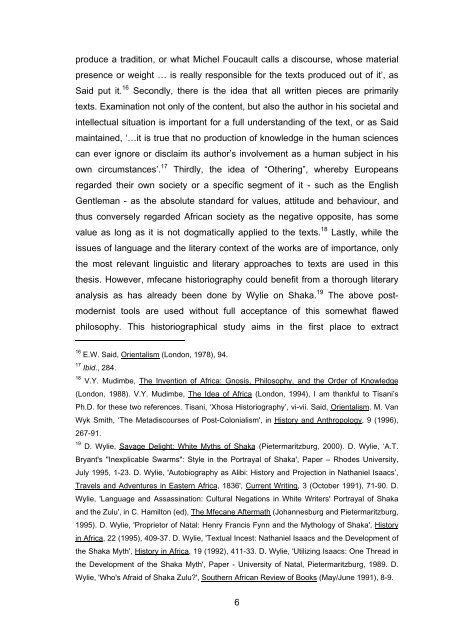The Historiographical Development of the Concept “mfecane” and ...
The Historiographical Development of the Concept “mfecane” and ...
The Historiographical Development of the Concept “mfecane” and ...
Create successful ePaper yourself
Turn your PDF publications into a flip-book with our unique Google optimized e-Paper software.
produce a tradition, or what Michel Foucault calls a discourse, whose material<br />
presence or weight … is really responsible for <strong>the</strong> texts produced out <strong>of</strong> it’, as<br />
Said put it. 16 Secondly, <strong>the</strong>re is <strong>the</strong> idea that all written pieces are primarily<br />
texts. Examination not only <strong>of</strong> <strong>the</strong> content, but also <strong>the</strong> author in his societal <strong>and</strong><br />
intellectual situation is important for a full underst<strong>and</strong>ing <strong>of</strong> <strong>the</strong> text, or as Said<br />
maintained, ‘…it is true that no production <strong>of</strong> knowledge in <strong>the</strong> human sciences<br />
can ever ignore or disclaim its author’s involvement as a human subject in his<br />
own circumstances’. 17 Thirdly, <strong>the</strong> idea <strong>of</strong> “O<strong>the</strong>ring”, whereby Europeans<br />
regarded <strong>the</strong>ir own society or a specific segment <strong>of</strong> it - such as <strong>the</strong> English<br />
Gentleman - as <strong>the</strong> absolute st<strong>and</strong>ard for values, attitude <strong>and</strong> behaviour, <strong>and</strong><br />
thus conversely regarded African society as <strong>the</strong> negative opposite, has some<br />
value as long as it is not dogmatically applied to <strong>the</strong> texts. 18 Lastly, while <strong>the</strong><br />
issues <strong>of</strong> language <strong>and</strong> <strong>the</strong> literary context <strong>of</strong> <strong>the</strong> works are <strong>of</strong> importance, only<br />
<strong>the</strong> most relevant linguistic <strong>and</strong> literary approaches to texts are used in this<br />
<strong>the</strong>sis. However, mfecane historiography could benefit from a thorough literary<br />
analysis as has already been done by Wylie on Shaka. 19 <strong>The</strong> above post-<br />
modernist tools are used without full acceptance <strong>of</strong> this somewhat flawed<br />
philosophy. This historiographical study aims in <strong>the</strong> first place to extract<br />
16 E.W. Said, Orientalism (London, 1978), 94.<br />
17 Ibid., 284.<br />
18 V.Y. Mudimbe, <strong>The</strong> Invention <strong>of</strong> Africa: Gnosis, Philosophy, <strong>and</strong> <strong>the</strong> Order <strong>of</strong> Knowledge<br />
(London, 1988). V.Y. Mudimbe, <strong>The</strong> Idea <strong>of</strong> Africa (London, 1994), I am thankful to Tisani’s<br />
Ph.D. for <strong>the</strong>se two references. Tisani, ‘Xhosa Historiography’, vi-vii. Said, Orientalism. M. Van<br />
Wyk Smith, ‘<strong>The</strong> Metadiscourses <strong>of</strong> Post-Colonialism', in History <strong>and</strong> Anthropology, 9 (1996),<br />
267-91.<br />
19 D. Wylie, Savage Delight: White Myths <strong>of</strong> Shaka (Pietermaritzburg, 2000). D. Wylie, ‘A.T.<br />
Bryant's "Inexplicable Swarms": Style in <strong>the</strong> Portrayal <strong>of</strong> Shaka', Paper – Rhodes University,<br />
July 1995, 1-23. D. Wylie, 'Autobiography as Alibi: History <strong>and</strong> Projection in Nathaniel Isaacs’,<br />
Travels <strong>and</strong> Adventures in Eastern Africa, 1836', Current Writing, 3 (October 1991), 71-90. D.<br />
Wylie, 'Language <strong>and</strong> Assassination: Cultural Negations in White Writers' Portrayal <strong>of</strong> Shaka<br />
<strong>and</strong> <strong>the</strong> Zulu', in C. Hamilton (ed), <strong>The</strong> Mfecane Aftermath (Johannesburg <strong>and</strong> Pietermaritzburg,<br />
1995). D. Wylie, 'Proprietor <strong>of</strong> Natal: Henry Francis Fynn <strong>and</strong> <strong>the</strong> Mythology <strong>of</strong> Shaka', History<br />
in Africa, 22 (1995), 409-37. D. Wylie, 'Textual Incest: Nathaniel Isaacs <strong>and</strong> <strong>the</strong> <strong>Development</strong> <strong>of</strong><br />
<strong>the</strong> Shaka Myth', History in Africa, 19 (1992), 411-33. D. Wylie, 'Utilizing Isaacs: One Thread in<br />
<strong>the</strong> <strong>Development</strong> <strong>of</strong> <strong>the</strong> Shaka Myth', Paper - University <strong>of</strong> Natal, Pietermaritzburg, 1989. D.<br />
Wylie, 'Who's Afraid <strong>of</strong> Shaka Zulu?', Sou<strong>the</strong>rn African Review <strong>of</strong> Books (May/June 1991), 8-9.<br />
6

















